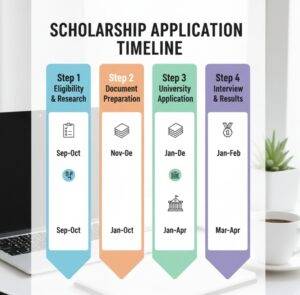Study in Korea: Your Ultimate Guide to Winning a Scholarship
Is your dream to study abroad set against the vibrant backdrop of Seoul’s skyscrapers and historic palaces? You’ve binged the K-dramas, you follow the K-pop groups, and now you’re ready to make Korea your classroom. But then reality hits: tuition fees, living costs, and confusing application forms. It can feel overwhelming, I know.
But what if I told you that getting a fully-funded study in korea scholarship for international students is not just possible, but completely within your reach? This guide is your personal roadmap. We’re going to cut through the jargon and the confusion to give you a clear, step-by-step plan to turn your dream into a reality. Let’s get started.
First, Let’s Understand the Scholarship Landscape
When you start searching, you’ll see many options, from university-specific scholarships to private foundation grants. However, the undisputed king of scholarships for international students is the Global Korea Scholarship, or GKS.
GKS is funded by the Korean government and is designed to bring outstanding international students to Korea. It’s an all-in-one package that typically covers:
- Round-trip airfare
- Full tuition fees
- A monthly living allowance
- Medical insurance
- A settlement allowance upon arrival
- A full year of Korean language training
Because of its comprehensive benefits, GKS is highly competitive. But that’s exactly why we’re going to focus on creating an application that makes you stand out.
Step 1: Are You Eligible? A Deep Dive into GKS Scholarship Requirements
Before you spend hours on your application, you need to do the most important thing first: confirm you’re eligible. Nothing is more heartbreaking than crafting the perfect application only to be disqualified on a technicality.
Here is a simple checklist of the core gks scholarship requirements for the undergraduate and graduate programs. Note: Always double-check the official guidelines for the specific year you are applying, as details can change.
- Citizenship: You must NOT be a Korean citizen. Both you and your parents must hold citizenship from a country outside of Korea.
- Age: For undergraduate applicants, you must be under 25. For graduate applicants, you must be under 40.
- Academic Grades: You need a strong academic record. The general requirement is a Grade Point Average (GPA) of 80% or higher from your last educational institution.
- Health: You must be in good physical and mental health to study in Korea for the duration of your program. You’ll need to pass a medical exam after being selected.
- Graduation Status: You must have graduated or be expected to graduate from high school (for undergraduate applicants) or have a Bachelor’s/Master’s degree (for graduate applicants) by the time you arrive in Korea.
Step 2: Crafting an Unforgettable Application
This is where you move from being just a number to being a person. Your documents are your chance to tell your story and convince the selection committee that you are the perfect candidate.
Key documents almost always include:
- Personal Statement: This is your “why.” Why Korea? Why this major? What are your future goals?
- Study Plan: This is your “how.” How will you excel in your studies? What is your academic plan?
- Letters of Recommendation: Choose recommenders who know you well academically and can speak to your strengths. Give them plenty of notice and provide them with your personal statement and study plan.
- Transcripts and Graduation Certificates: These must be official and, in many cases, apostilled.
My Pro Tip: I remember staring at the blank ‘Personal Statement’ page, feeling completely stuck. The key is to connect your personal story to your academic goals in Korea. Don’t just say you like K-pop. Explain how your interest in the Korean media industry led you to want to study Media & Communication, and how that degree in Korea will help you achieve your goal of becoming a global media producer. Be specific, be passionate, and be authentic.
Step 3: Finding Your Perfect University & Program
With GKS, you can apply via the “Embassy Track” (choosing up to 3 universities) or the “University Track” (choosing only 1). Research is critical. Don’t just pick a university because it’s in Seoul or you’ve heard its name.
Consider these factors:
- Program Availability: Does the university offer the specific major you want to study?
- Location & Campus Life: Do you thrive in a bustling city like Seoul, or would a campus in a scenic city like Busan be a better fit?
- Language Preparation: Before you even apply for GKS, building some basic Korean skills is a huge advantage. Look for online courses or local programs. There are also excellent korean language programs in busan and other cities if you plan to study the language in-country first.
Mini Case Study: How to Apply to Yonsei University
Let’s say your dream is to attend Yonsei University, one of the top private universities in Korea. If you’re applying through GKS, you would list it as one of your choices. But you also need to check Yonsei’s specific requirements for international applicants.
- Visit the Yonsei Office of International Affairs website. This is your primary source of information.
- Find your desired department. Look for the specific English-taught programs and the curriculum.
- Check for department-specific requirements. Some departments, especially in arts or sciences, might require a portfolio or have prerequisite courses. Even if GKS doesn’t require it, the university might.
Step 4: Mastering the Application Timeline & Submission
The GKS timeline is fairly consistent but can vary slightly each year. Mark these dates on your calendar!
- Embassy Track: Applications typically open in September. You submit your documents to the Korean Embassy in your home country.
- University Track: Applications usually open in October. You submit your documents directly to your chosen university in Korea.
- Deadlines: These are strict. Deadlines for the Embassy track are often in mid-to-late October, while University track deadlines can be a bit later.
Always start preparing your documents at least 2-3 months before the application period opens. Getting official transcripts, translations, and strong letters of recommendation takes time.
A Realistic Look: The Cost of Living in Seoul for Students
Even with a scholarship, it’s smart to budget. While GKS provides a generous stipend (around ₩1,000,000/month), the cost of living in seoul for students can be high. Here’s a rough monthly breakdown:
- Dormitory/Shared Housing: ₩300,000 – ₩600,000
- Food: ₩300,000 – ₩400,000 (if you cook and eat at university cafeterias)
- Transportation: ₩50,000 (with a student transit card)
- Phone/Internet: ₩50,000
The GKS stipend is designed to be sufficient, but you won’t be living lavishly. Budgeting is key!
Conclusion: Your Dream is Waiting for You
Securing a study in korea scholarship for international students is a marathon, not a sprint. It requires careful planning, dedication, and a belief in yourself.
You have the passion. Now you have the plan. Break it down into small, manageable steps:
- Confirm your eligibility.
- Start gathering and drafting your documents now.
- Research your universities and programs deeply.
Your dream of walking through a Korean university campus, of late-night study sessions fueled by convenience store ramen, and of making lifelong friends from around the world is not just a fantasy. It’s a goal. And you have everything it takes to achieve it. Now, go get started.
Frequently Asked Questions (FAQ)
Q1: Can I get a scholarship to study in Korea without knowing any Korean?
A: Yes, absolutely! The GKS scholarship includes a mandatory one-year Korean language program before you begin your degree studies. This is designed to get you to a level of fluency (TOPIK Level 3 or 4) needed for your academic life. While knowing some Korean beforehand is a big advantage for your application, it is not a strict requirement to be selected.
Q2: What are the biggest mistakes to avoid in my scholarship application?
A: The three biggest mistakes are: 1) Missing the deadline or submitting incomplete documents. 2) Writing a generic personal statement that isn’t tailored to Korea or your specific academic goals. 3) Choosing recommenders who don’t know you well and write weak, impersonal letters. Pay close attention to detail and give your story the attention it deserves.
Q3: Besides GKS, what are some other scholarships for international students?
A: While GKS is the most comprehensive, many top Korean universities offer their own generous scholarships for international students. These often cover 30-100% of tuition fees. Examples include scholarships from Seoul National University (SNU), Yonsei University, and Korea University (KU). It’s always a good idea to check the international admissions page of the specific universities you are interested in.
Study in Korea Scholarship The Ultimate Application Resource Kit.pdf
Hi, I’m [jeybee]. As a long-time resident of Seoul, I’m passionate about uncovering the authentic, everyday magic of Korea. This blog is my way of sharing my favorite spots, tips, and cultural insights with you, beyond the usual tourist traps.



